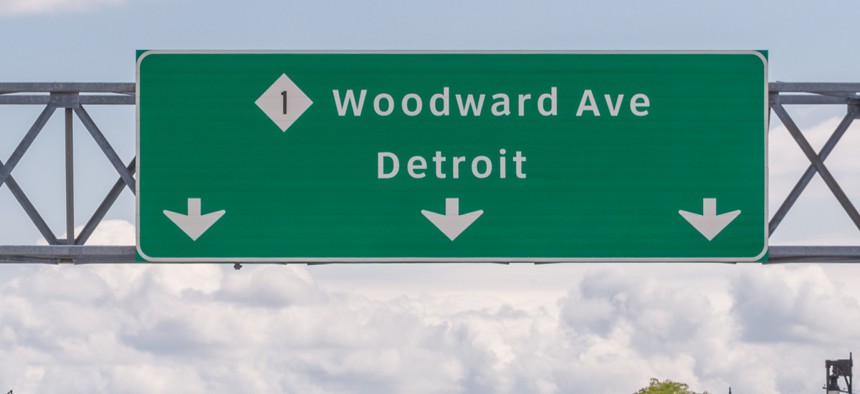Bipartisan Plan Aims to End One of Michigan’s Dubious Distinctions

Shutterstock

Connecting state and local government leaders
Drivers in the Great Lakes State have paid the nation’s highest auto insurance rates, described as “a surcharge on people who have low socioeconomic status.”
Michigan political leaders Tuesday unveiled a bipartisan plan to bring relief to state residents who for years have suffered the highest car insurance rates in the nation.
Detroit Mayor Mike Duggan, a Democrat, and Michigan House Speaker Tom Leonard, a Republican, announced a plan they said would drop premiums from 20 percent to 50 percent for coverage plans that would cap lifetime health benefits at between $250,000 and $500,000.
“We are going to give drivers actual choice in the amount of insurance they buy,” Duggan said at a press conference in Lansing, according to The Detroit News. He added that the minimum $250,000 injury coverage cap the new plan proposed would match the cap imposed by New Jersey as the most generous in the country.
Senate Majority Leader Arlan Meekhof, a Republican, criticized the plan as anti-free market “price fixing.”
Other critics argued that Duggan and Leonard were proposing to drop mandated coverage in Michigan by an incalculable amount. Right now, all insured drivers in the state enjoy unlimited injury coverage.
Oakland County Executive L. Brooks Patterson, who was injured in a 2012 car crash, described the plan as robbery. “A $500,000 cap on a catastrophic accident would probably last you two to three weeks, that’s how expensive it is in emergency care,” he told The Detroit News. “After that, who pays for your care? It goes over to Medicaid, a publicly funded insurance program you and I and every citizen in Michigan pays for.”
All drivers in Michigan pay a $170-a-year catastrophic claims fee for each vehicle they own. It’s part of an approach to coverage launched in 1973 when legislators mandated that residents buy “no fault” auto insurance policies meant to limit lawsuits and guarantee universal unlimited injury coverage.
Over the years, the 1973 law has come to expose weaknesses in the insurance market that have cost consumer enormous sums.
Recent local and state town halls have featured crowds of frustrated constituents complaining that they’re paying rates that have tripled and sometimes quadrupled in the last decade. Insure.com reports that premiums in the state average $2,400 a year, which is almost twice the national average. In Louisiana, where drivers pay the second-highest rates in the nation, premiums average $1,921.
Nowhere else in the country do auto insurers provide health coverage. Duggan, who was Detroit Medical Center CEO for nearly a decade, has argued that the amounts billed to auto insurers for medical procedures is enormously high. An MRI scan is billed $484 to Medicare dollars, he said, $770 to private insurers and $3,259 to auto insurers.
The legislation Duggan and Leonard are proposing also suggests that consumer gouging and fraud have driven up Michigan premiums.
According to a State House release, the bipartisan reform bill would require that any savings be passed to drivers and not “be kept in insurers’ pockets” and, further, that any insurance rate increases over the next five years would be regulated by the state.
The plan also bans lawyers and their families from “profiting from financial interests, direct or indirect, in medical care facilities, a conflict of interest that often creates a financial incentive for lawyers to drive up unneeded medical services.”
Duggan has called Detroit’s high auto insurance rates “the biggest scandal in the state.”
He is not alone in that line of thinking. Social justice advocates have said the insurance rates amount to a tax on urban and working-class Michigan residents.
A study commissioned by the Coalition Protecting Auto No-Fault, which generally backs the state’s 1973 law, supported that perspective.
California-based consultant Doug Heller released a report last month that documented 240 premium quotes obtained online from six major Michigan insurers. He found that most insurers charge Michigan drivers more if “they have blue-collar jobs or are unemployed, don’t have a college degree and rent rather than own their home.”
“What we see here is a surcharge on people who have low socioeconomic status,” Heller told The Detroit News.
Heller found that a Detroit attorney who owns her home would pay about $3,843 a year for no-fault auto insurance. The same resident would pay $4,487 if she rented her home, were unemployed and lacked a high school diploma.
John Tomasic is a journalist based in Seattle.

NEXT STORY: SNAP Benefits Could Help Cut Health Care Costs, According to New Research




